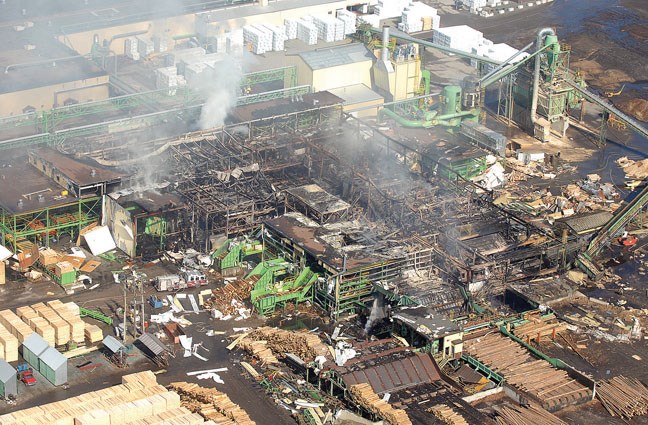WorkSafeBC has concluded its investigation into the explosion which destroyed Lakeland Mills and has forwarded its report to the B.C. Criminal Justice Branch.
However, WorkSafeBC spokesperson Scott McCloy said the agency is not recommending any criminal charges in the April 23, 2012 explosion and fire which killed workers Glenn Roche and Alan Little, injured many others and left 150 people out of work.
"That material... was forwarded Crown for consideration under the Workers Compensation Act. It is not criminal charges," McCloy said. "We sent that on Wednesday."
The Crown now has until April 23 -the two-year anniversary of the explosion - to decide whether to act on the information provided by WorkSafeBC, McCloy said.
McCloy declined to comment further on the investigation - and the nature of the charges recommended - other than to say that the report included a substantial amount of information.
In January, the Crown dropped all four regulatory charges recommended by WorkSafeBC in the case of a similar explosion at Babine Forest Products in Burns Lake in January, 2012.
Two workers also died in the Babine Forest Products explosion.
In a statement the Criminal Justice Branch said the investigation style used by WorkSafeBC in the Babine investigation rendered significant amounts of evidence inadmissible to court and the mill owners could show a pattern of due diligence pertaining to workplace dust safety, making it unlikely that Crown could win a conviction.
"[WorkSafeBC] was not using any standard major case management methodology. This approach left important issues partially or wholly unexamined," said Crown's statement. "Within the specific context of the Babine investigation, this approach has significant implications for the legal admissibility of evidence gathered by [WorkSafeBC]."
McCloy declined to comment on WorkSafeBC's confidence in its investigation methods or the likelihood of similar concerns being raised by the Crown in the case of Lakeland Mills.
It is completely up to the Crown to decide what it will do with the information now, he said.
A spokesperson for the Criminal Justice Branch was unavailable for comment as of press time.
In the case of Babine Forest Products WorkSafeBC linked the explosion to the accumulation of sawdust and had recommended that charges be laid for:
Failing to prevent hazardous accumulation of material
Failing to safely remove combustible dust
Failing to ensure the health and safety of workers
Failing to remedy hazardous workplace conditions
Since the announcement by the Crown in January, the B.C. Coroners Service announced it will conduct an investigation into the Babine explosion. In addition, last month Premier Christy Clark said she has appointed the B.C. Civil Service, deputy minister John Dyable, to review the WorkSafeBC investigation and Crown counsel decision.
A spokesperson for Sinclar Group Forest Products, the parent company of Lakeland Mills, could not be reached as of press time.
Reconstruction of Lakeland Mills began on July 22 and, in previous statements, Sinclar president Greg Stewart said he anticipates the mill will reopen this fall.



